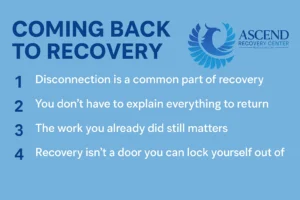You were showing up. Doing the work. Making progress.
And then… something shifted.
Maybe it was a tough session that cracked something open. Maybe life outside of treatment demanded more than you had to give. Or maybe you didn’t even notice the drift—until the space between you and your recovery felt wide enough to get lost in.
Now you’re wondering: Is it too late to come back? Did I lose my chance? Would they even want me back in the room?
We want you to know this: at Ascend Recovery Center’s IOP in Charlotte, the door is still open. You are not disqualified by distance. Feeling disconnected doesn’t mean you’ve failed—it means you’re ready to reconnect.
1. Disconnection Is a Common Part of Recovery
You’re not broken. You’re not the only one. You’re not behind.
Most people in treatment hit moments of emotional flatness, avoidance, or total disengagement. It happens during the work. After the work. Sometimes even before the work begins.
Disconnection is part of the recovery cycle, not a detour from it. It can show up as:
- Not wanting to go to group
- Feeling numb during sessions
- Forgetting what motivated you to start
- Feeling like you’re pretending to care
- Ghosting after one “off” day and then feeling too ashamed to return
Sound familiar? You’re not alone. The myth that recovery has to be a straight line has caused more shame than relapse ever has.
2. You Don’t Have to Explain Everything to Return
One of the biggest blockers to re-engaging with IOP isn’t the time away—it’s the pressure to explain it perfectly.
Here’s the truth: you don’t have to unpack everything to be allowed back in.
You don’t have to account for every missed session or every choice you made while you were out. You don’t have to come back with a polished narrative or a list of resolutions. You just have to come back. Quietly, awkwardly, honestly.
A simple message—“Hey, I think I want to try again”—is enough.
We’re not keeping a scorecard. We’re keeping the seat open.
3. The Work You Already Did Still Matters
Even if you ghosted halfway through. Even if it’s been weeks. Even if you’ve used since. The time you spent in IOP wasn’t wasted.
You might be thinking, “If I left, it probably means I didn’t get much out of it.” But that’s not true.
You probably absorbed more than you realized. Sometimes the work you did before you walked away is exactly what gives you the courage to return.
You said things out loud that you’d never said before. You looked at yourself in ways that were uncomfortable—but honest. And somewhere in all of that, the seed was planted.
Coming back is proof it’s still growing.

4. You Can Reconnect Without Performing
One of the traps high-functioning clients fall into is the belief that they need to “perform” recovery well to deserve another chance.
You don’t.
You can come back confused. Unmotivated. Quiet. Skeptical. You don’t have to say the “right” things. You don’t have to cry on cue. You don’t have to feel inspired.
You just have to show up.
At Ascend, our IOP in Charlotte was designed for real life. That means your real life—including the hard parts, the unsure parts, the “I’m just here because I don’t want to give up completely” parts.
We’ve had people return after ghosting for weeks or months. Not one of them needed to put on a show. All of them were welcome.
5. Progress Isn’t Erased By Pausing
There’s a lie that says once you stop showing up, your progress disappears.
That’s not true. You can pause and still carry everything you learned. You can step away and still be someone worthy of healing.
Progress isn’t measured by perfect attendance. It’s measured by your willingness to re-engage—even when it’s awkward. Even when you’re not sure if it’ll work. Even when you’re not sure you believe it anymore.
If you’re still thinking about recovery—even with doubt—you’re still in it.
6. You Can Come Back Quietly (And Still Be Seen Fully)
Returning doesn’t have to be loud. You don’t need to make an announcement or explain yourself in front of a group.
Reach out quietly. Walk in soft. Take your time.
We’ll meet you where you are. No questions you don’t want to answer. No assumptions about why you left.
At Ascend Recovery Center in North Carolina, we’ve walked with many people through this phase—the “middle” of their story. The part where hope flickers but doesn’t go out. The part where they almost quit for good… but didn’t.
7. Recovery Isn’t a Door You Can Lock Yourself Out Of
Sometimes disconnection comes with a deeper belief: I’ve ruined it. I had my chance.
But recovery is not a single shot. It’s a relationship—with yourself, with your community, with your capacity to change.
Relationships have quiet seasons. Disagreements. Space. They also have reconnection, repair, and grace.
No matter how far away you feel, you’re not locked out. You can knock. Or whisper. Or crack the door just enough to say, “Can I come back?”
The answer is yes.
FAQs: Reconnecting With IOP After Disconnection
Do I have to start over if I return to IOP?
Not necessarily. We’ll look at how long you’ve been away and talk through what makes sense. Sometimes you pick up where you left off. Sometimes we adapt. It’s flexible.
What if I’ve used since I left?
You’re still welcome. Using again doesn’t erase your worth or your progress. Let us help you come back safely and with support.
Will I be judged for ghosting or dropping out?
No. Our team understands that this is part of the process for many people. There’s no punishment for needing space.
Can I talk to someone before deciding to return?
Yes. You can call or message just to talk. There’s no pressure to commit. We’re here for the conversation, not just the enrollment.
What if I feel unsure or unmotivated?
That’s actually a good time to reconnect. You don’t need to feel “ready” to take a step. Sometimes the action comes first—and the feeling catches up.
The Truth Is: You’re Already Closer Than You Think
You might feel like you’re miles away. But you’re reading this. You’re here. That matters.
Disconnection isn’t the end of your recovery story. It’s a chapter. And chapters can turn fast—with one call, one session, one moment of truth.
You don’t need to wait until you feel “ready.” You don’t need to fix everything before you show up.
You just need to remember: healing is not a race. It’s a rhythm. And you’re still part of it.
Call (866) 606-5732 or visit Ascend’s intensive outpatient program in Charlotte to talk about reconnecting—on your terms, at your pace. You’re not too far. You’re not too late. And you are still worth the work.


